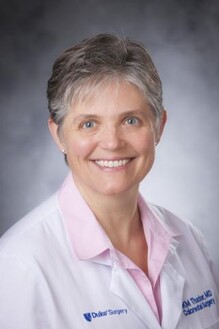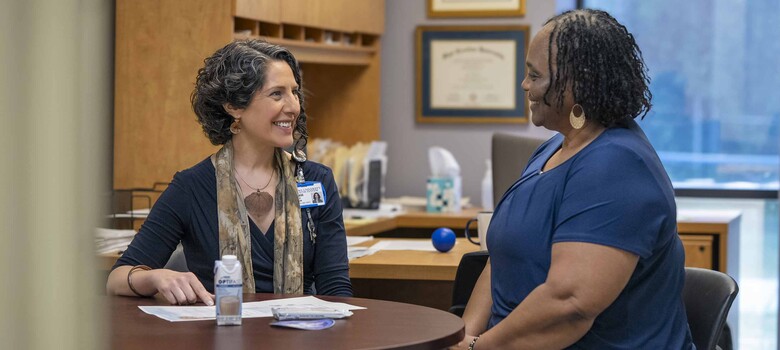Enhanced Recovery Shortens Hospital Stays, Improves Patient Outcomes

Julie Thacker, MD (left) is the co-founder and past president of American Society for Enhanced Recovery.
A set of medical guidelines called enhanced recovery after surgery puts patient comfort and safety first -- before, during, and after surgery. Since Julie Thacker, MD, a colorectal surgical oncologist, pioneered enhanced recovery at Duke in 2008, it has expanded from one surgical specialty to 12 and is standard practice in hospitals across the U.S. Enhanced recovery is proven to decrease the length of hospital stays and readmission rates after surgery so patients can feel better and get back to their lives faster.
Maximizing Nutrition, Minimizing Pain
Enhanced recovery does away with traditional practices around surgery -- including fasting, powerful pain medicines, and bed rest -- and replaces them with patient-centered care. In most cases, people eat normally the day before surgery and are encouraged to do the same afterward. “There's no reason to starve people,” said Dr. Thacker. “It just increases the risk for infection, wound breakdown, malnutrition, and worse cancer outcomes.”
When possible, minimally invasive surgical techniques are used so patients experience less pain and require less powerful medication after surgery. In addition, they are encouraged to get out of bed as soon as possible after surgery. Patients are not required to stay in the hospital for a set number of days. Instead, they must drink to stay hydrated, take medicines by mouth, and be mobile. “Whenever they meet those criteria, whether it be one day or one week, that's when they go home,” explained Dr. Thacker. This practice not only allows patients to recover at home, it also opens more hospital beds for patients who need them.
Expanding Enhanced Recovery at Duke and Beyond
When she introduced enhanced recovery at Duke, Dr. Thacker started with colorectal resection surgery, which removes part of the colon to treat colorectal cancer. Within a year, the average length of stay for these procedures fell from more than a week to two to three days. “More importantly, we saw a decrease in complications,” she stated. Over time, enhanced recovery expanded to other surgical specialties at Duke including urology, gynecology, cancer, cardiothoracic, and spine, among others. Today these practices, like allowing liquids up to two hours before surgery, are standard at Duke, and hospitals throughout the U.S. have followed suit. Enhanced recovery is now considered the accepted standard of care, Dr. Thacker said.
A Personalized Approach
According to Dr. Thacker, patient involvement is an essential component of enhanced recovery. She and her colleagues make sure patients are engaged in the process and understand the goals. On her end, Dr. Thacker personalizes the process for every patient. If someone has special dietary needs or is allergic to a particular pain medication, for instance, she and her team make the necessary adjustments.
The Way Patients Should Be Treated
Enhanced recovery is no longer a specialty service. “It's just how we take care of our patients because it's proven to be better,” explained Dr. Thacker. “Decreasing surgical stress and improving recovery is what patients should expect. And if they are at a facility that doesn’t offer enhanced recovery, they should consider coming to one that does.”



